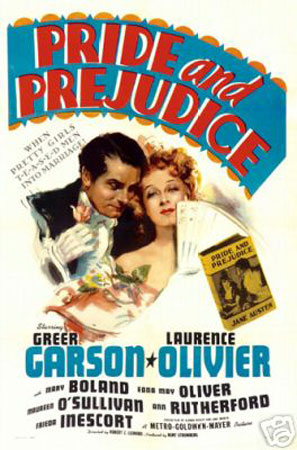
PRIDE AND PREJUDICE
US, 1940, 116 minutes, Black and white.
Laurence Olivier, Greer Garson, Edmund Gwenn, Mary Boland, Melville Cooper, Edna May Oliver, Karen Morley, Frieda Inescort, Ann Rutherford, Maureen O' Sullivan, E. E. Clive, Heather Angel, Marsha Hunt.
Directed by Robert Z. Leonard.
Pride and Prejudice is a classic MGM film from the early 40s, with the casting of Laurence Olivier and Greer Garson. Greer Garson had made a great impact with Goodbye Mr Chips and Blossoms in the Dust and seems a perfect Elizabeth Bennett. Laurence Olivier plays a cautious and mannered Darcy (perhaps a cousin of his Heathcliff from Wuthering Heights two years earlier). There is an excellent supporting cast with Edmund Gwynn as Mr Bennett and an excited Mary Boland as Mrs Bennett. Maureen O'Sullivan was Jane, Marsha Hunt and Ann Rutherford as younger sisters with Edna Mae Oliver as a fearsome Lady Catherine de Burgh.
The screenplay was co-written by novelist Aldous Huxley, based on a play of the novel by Helen Jerome. The set design won an Oscar.
The film explores Jane Austen's theme of both pride and prejudice in Elizabeth and Darcy. It is an excellent re- creation of England in the 18th century, its manners, morals and its personal dilemmas. In the 1990s, the BBC produced a classic television series of the drama with Jennifer Ehle as Elizabeth and Colin Firth as Mr Darcy.
1. This film is considered something of a classic. Has it dated? Even if it has, does this detract from the film? The film as an adaptation of a classic? Aldous Huxley's contribution?
2. How well presented the setting, the manners and the atmosphere of this kind of English society? what details best illustrate this? M.G.M. production values? The black and white photography? Recreation of the 19th century? Musical score?
3. What kind of a world was that of Jane Austen? The people, their style of life, house, entertainment, values? The way they interacted? What they held to be very important for life. for success? How were these illustrated in the film? Did the film visualise well the world and values of Jane Austen? Jane Austen's England: the town Merryton, homes. the township itself, the balls, meals. fairs? The attention to decor, costumes?
4. To whom did the Pride of the title refer? How proud was Darcy? Why? How did this manifest itself in his behaviour, his arrogance, his conversation, his seriousness? Which other characters had pride? How proud was Lizzie and in what way? How proud was Bingley? How proud were the Bennetts? How proud was Lady Catherine de Burgh? How proud was Mr Collins? What conclusions about human pride and behaviour can we draw from these characters? Has such pride any real value? or is it sham and hypocrisy?
5. To whom did the Prejudice of the title refer? Why was Lizzie prejudiced? Of what did her prejudice consist? How were the other characters prejudiced? What conclusions about human prejudice can we draw from the film?
6. Expectations of life in England at the beginning of the 19th. century: the Bennetts and their lifestyle, the Bingleys and their snobbery, Mr Darcy and Lady Catherine de Burgh? Money? Well-made marriage matches, dances...?
7. The emphasis on wealth, birth, breeding, society, class distinctions? Behavioural attitudes and what was proper? Surface behaviour and the contrast with personal and social values?
8. The portrait of the Bennetts as a family: father and his books, wearied by the women in the family, avoiding all the talk, Lizzie as his favourite? His ironic treatment of Mrs Bennett? Mrs Bennett and her superficiality, her gossip, the seeing of Bingley and Darcy from the shop, the rivalry to get home first, the carriage chase? Her scheming, plotting? Her tantrums? Her swift change of moods? Kitty and Lydia being younger versions of her? The whole focus of her life in getting husbands for her daughters? Her superficial judgments of people?
9. Lizzie and her place in the family? Sense and sensibility? Jane and her attractiveness? The intelligent daughters? Their reaction to their mother, to the way of life in the town, society expectations? Lizzie and her noting Mr. Darcy? The antagonism towards him e.g. overhearing him at the dance, the archery contest? Her gratitude for his saving her from Mr Collins? Her feeling humiliated in his remarks about her mother? The clashes with Miss Bingley, especially at the fair? Jane and her illness and her visits? Her reading the book, her capacity for playing cards? Her continued friendship with Charlotte and her reaction to her marrying Mr Collins? The drama of her refusing Mr Collins' proposal? Her loyalty towards Wickham and her anger at Mr Darcy? Her reaction to his proposal? Her coping with the problems especially with the disappearance? The discovery of the truth about Darcy? The helping with the move from the town? The visit of Lady Catherine and the verbal sparring? The happy ending? Her behaviour, attitudes, words, breaking down prejudice? Greer Garson's style?
10. Laurence Olivier as Mr Darcy, his arrival in the town, snobbery, his not smiling, his antagonism towards Wickham, slights towards the family and Lizzie's refusing to dance with him, the archery contest, being snubbed? Moving the family away? His meeting with Lizzie and proposing? His humiliation? His helping Wickham? The ending?
11. Jane as attractive, falling in love with Bingley, Miss Bingley and her snobbery, behaviour towards Lizzie and Jane? Laughing at the letter about the gossip? The billiards sequence?
12. Darcy's treatment of Wickham, Wickham and the soldiers, the irony of the truth? His running away? His story about the legacy? Marriage? The extravagance and Mrs Bennett's response to it?
13. Mary and the comedy about her singing, piano playing, books? Her prospective husband?
14. Mr Collins and the inheritance, his pomposity, proposal to Lizzie, marriage of Charlotte, the visits, Lady Catherine de Burgh?
15. Lady Catherine and her pomposity, Darcy, the piano recital, Anne?